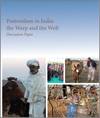Pastoralism is a practice that makes the best use of natural resources in the context of sustainability, availability, and environmental limitations, while producing wealth for the herder families as well as for the nation. This photo feature traces the lifestyle of some of these nomadic herders and shows the hardships they face with a shrinking of their resource base. It serves as a soft advocacy tool and calls for a benevolent state to protect the interests of the pastoralists.
Year of publication: 2016Organization: 个人作者
Topic: 经济, 性别和青年问题, 土著知识, 土著人民, 组织, 参与, 社会服务
Language: English
Type of document: 技术
Geographical coverage: 南亚
Pastoralists are believed to form 7% of India’s population, i.e., about 88 million people, inhabiting mainly the arid and semi-arid areas of the country. Pastoralism – an old dynamic production system prevalent throughout the world – is economically productive and ecologically sustainable, and uses variability in a positive way. Yet, pastoralism does not get the recognition it deserves. This paper discusses the benefits and challenges of pastoralism and gives ten recommendations how to strengthen pastoralism in India.
Year of publication: 2016Organization: 个人作者
Topic: 经济, 土地, 参与, 社会服务
Language: English
Type of document: 技术
Geographical coverage: 南亚
En la actualidad, en el medio rural de América Latina, la existencia o prevalencia de las sociedades pastorales no es tan evidente, ya que la agricultura familiar campesina se encuentra en el contexto del cual la relación entre las comunidades y su cría es condición esencial para su sostenibilidad. Contribuyendo a la conservación de la biodiversidad del ecosistema, especialmente de los pastos, y como un recurso esencial para la vida y la producción como fuente de proteínas para alimentos y fibra para uso textil, tanto en la industria como en la industria. Este número de Leisa destaca la importancia de los pastores.
Year of publication: 2016Organization: 个人作者
Topic: 气候变化, 经济, 环境服务, 土著知识, 创新, 组织, 增加价值
Language: Español
Type of document: 时事通讯
Geographical coverage: 拉丁美洲
In the Sahel, around 65% of the active population works in the agriculture sector and their livelihoods are therefore affected by climate change, markets and environmental factors.
To address these recurrent crises, analytical tools to assess the situation and identify vulnerable
populations have been set in place in the region and refined in recent years. In addition, innovative practices have been developed, to support risk reduction, climate change adaptation, the fight against malnutrition and social protection.
This booklet presents 11 good practices organized around 5 themes, including livestock, with a particular focus on pastoralism.
Year of publication: 2016Organization: 联合国粮食及农业组织
Topic: 气候变化, 环境服务, 食品安全, 性别和青年问题, 参与, 复原力
Language: English
Type of document: 技术
Geographical coverage: 西部非洲
Millions of people worldwide, including pastoralists, depend on the commons for their livelihood, cultural identity and wellbeing. Secure tenure rights to commons can provide incentives for the environmentally sustainable use of natural resources and for responsible investments in the productivity of the resource systems. This guideline proposes strategies to secure legitimate tenure rights to commons including strategies for legal recognition and protection, strategies for implementation by states and rights holders, and, finally, the strategies to support the enjoyment of rights. It also includes seven illustrative cases of practice from around the world, and methodological steps for national and local adaptation.
Year of publication: 2016Organization: 联合国粮食及农业组织
Topic: 食品安全, 土著人民, 土地, 参与
Language: English, Français, Español
Type of document: 技术
Geographical coverage: 全球
A case study highlighting how the Oldokhiin Devjikh pastoralist community in Khuld soum (town) of Dundgobi is surviving under challenging climate conditions. In this part of the Gobi Desert, their initiatives involves building relationships between herding livestock in a traditional way and planting trees to cope with sand movement and land degradation and putting efforts into spring water conservation. This community is a member of Mongolian Alliance of Nomadic Indigenous Peoples (MANIP), which is a national network coordinated by pastoralist leaders supported by FAO`s Pastoralist Knowledge Hub programme.
Year of publication: 2016Organization: 联合国粮食及农业组织
Topic: 气候变化, 复原力
Language: English
Type of document: 技术
Geographical coverage: 中亚地区
Modern dairy plants buy fresh milk from local farmers and herders to make into many different products. The company pays a fair price, but requires strict hygiene: they only buy milk that is clean and fresh.
Year of publication: 2016Organization: 个人作者
Topic: 经济, 增加价值
Language: English, Français, Hausa, Yorùbá
Type of document: 视频
Geographical coverage: 西部非洲
Ticks are small creatures like insects that attach to the body of animals to suck their blood. Ticks cause diseases like skin lesions. The animals will become skinny and no longer produce milk.
Year of publication: 2016Organization: 个人作者
Topic: 经济
Language: English, Français, Hausa, Yorùbá
Type of document: 视频
Geographical coverage: 西部非洲









